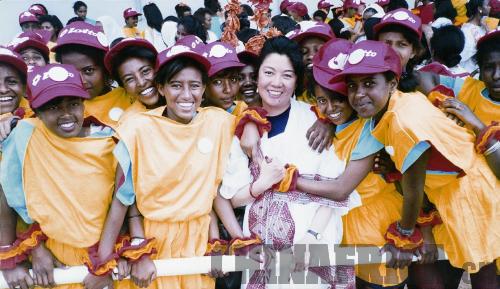|

After your many travels, what is your impression of Africa?
[The] optimistic attitude toward life has impressed me most. This impression has never changed. Africans are kind, honest, smart and learn fast. When I was there, my teachers and classmates always helped me, and later we became good friends. When studying in Tunisia, I suffered from a drug allergy and felt very weak. My African classmates sent me local herbs and prayed for me. On my birthday, my roommates put their money together to buy me coke and cakes, and sang songs for me. I was really moved.
You studied in Africa twice. How were those experiences?
When I studied abroad, I encountered many difficulties, but my family supported and encouraged me, and I am very grateful to them. When I decided to study in Senegal, I was 40 plus. Before I went there I spent one year studying French, which was a big challenge for me. During my stay there I contracted malaria, but I overcame my difficulties and completed my study.
What I learned in Africa helped me go a step further in my studies and research of African dance. It also gave me a lot of inspiration. After I came back, I choreographed many dances, one of which is called The Place Closest to the Sun. My inspiration came from the hot sun in Africa. In addition, my stay there made my character stronger. I became more optimistic and open-minded. I also love local African dishes, clothes, wood carvings – all of which made my life there richer and more colorful.
What role do you think dance plays in the lives of Africans? What are the similarities and differences between African dance and Chinese dance?
For Africans, dance is like salt – it's indispensable in their lives. [While] the costumes in many African dances are not gorgeous, their passion has a great spiritual impact. The dances of the Wa ethnic group in south China's Yunnan Province are very similar to African dance, as most of their movements demonstrate daily life [activities] like working.
There are various African dances, with different regions and tribes featuring their own dances. Some are lyrical, while others are ebullient. But generally speaking, African dances are rhythmic, vigorous and emphasize interaction with the audience. It's a good thing that now more Chinese young people are looking to learn African dance.
Are there any particular projects you wish you could work on?
Now I still pay close attention to African dance. Every time African dance troupes tour China, I go to watch their performances and want to know the current developments in African dance. I'm also very interested in the influence of Chinese cultural centers set up in Africa. If the opportunity arose, I would go back and revisit my teachers and friends. If I were 20 years younger, I would set up an African dance school [in China], so that I could teach what I've learned to more people. |